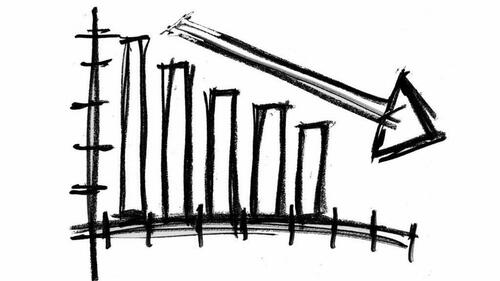Peter Schiff: It’s Getting Harder To Deny Recession Reality
It’s getting harder and harder for recession deniers to justify their optimism. And some people seem to be waking up to that reality.
Late last week, we got more economic data and corporate earning news that proves the economic optimism that’s been bandied about for months is unfounded.
Weekly first-time jobless claims rose for the third consecutive week, hitting 251,000. This was higher than projected and it’s the highest level of jobless claims since last October.
The Philadelphia Fed Manufacturing Index for July also came out. The consensus was for 0.4, up from June’s -3.3 print. Instead, the number came in at -12.3. That was 50% below the low end of the consensus. Meanwhile, the employment index declined 9 points to 19.4. That was its lowest reading since May 2021.
The leading economic indicator index for June fell 0.8% in June off a May number revised lower to down 0.6%. It was the fourth straight monthly decline in that index.
The composite PMI index fell to 47.5 in July from 52.3 in June, hitting a 26-month low. The PMI services index fell even lower to 47. Anything below 50 is supposed to indicate a recession. Peter said the big drop in the service sector was particularly troubling.
When you have a 47 on the services index, you know the US economy is in recession because the service sector is what everybody looks to to power the economy.”
Peter said this data really should surprise people because it’s nothing new.
This should be obvious, but people have been in denial about the weakness in the economy. So, as all this weak economic data continues to come out, more and more of the recession deniers are going to have to throw in the towel and accept reality — including all of the recession deniers at the Federal Reserve.”
The Atlanta Fed continues to project a second straight month of negative GDP growth in the second quarter. Currently, it projects a -1.6% decline. It will release one more projection before the actual numbers come out. Peter said he thinks it will be around -2. That would indicate the second quarter was actually weaker than Q1.
After we got the negative GDP print in the first quarter, the mainstream blew it off, asserting that it was just an outlier.
When we end up with an even weaker number for the second quarter, that really throws a bunch of cold water in the face of the idea that we have a strong economy. And given how weak the Q3 data already is… We don’t have a lot of July data yet, but it’s starting to come in and what we’ve seen is pretty ugly. And it makes a lot of sense that the third quarter would be even weaker than the first two because interest rates are going to be a lot higher in the third quarter than they were back then. Next week, the Fed is set to raise interest rates 75 basis points. We’re going to be up to 2.25 to 2.5%. If we were in recession when interest rates were 0.5%, 1%, 1.5%, think about how much worse that recession is going to be when interest rates are higher.”
In this podcast, Peter also talks about the first ECB rate hike in 11 years, a possible top in the dollar, a possible bottom in gold, and the pain tech companies are feeling as advertisers flee.
Tyler Durden
Mon, 07/25/2022 – 10:20

